Carl E. Olson's Blog, page 207
July 18, 2012
Blithe Christianity and the Last Free Election
Blithe Christianity and the Last Free Election | Fr. James V. Schall, S.J. | Catholic World Report
I.
Bruce Fingerhut in South Bend called my attention to Father George Rutler’s essay in crisismagazine.com (July 13), entitled. “Post-Comfortable Christianity.” Father Rutler is the well-known pastor of the Church of Our Savior in New York City. He is a man of many, many talents, a witty and insightful lecturer, often on EWTN. With his Scot origin, he has been known to appear in the kilt version of the Roman Collar at the Highland Games. Rutler is a convert Episcopal priest who speaks the King’s English, speaks it well and clearly.
The title, “Post-Comfortable Christianity,” Rutler explains, is not used in place of “Post-Christian,” since “nothing can come after Christ,” a profound theological observation in itself. We have lived as Catholics in relative peace in recent times. We think we belong and are accepted by this culture. Indeed, we have sometimes bought an easy version of our faith that requires little sacrifice and no Cross.
We have not had to worry, or so we thought, about ourselves being discriminated against or persecuted. Such despicable activities were, we thought, against the law. They were events that happened “elsewhere.” We never thought that our law could itself be “against the law.” The Third Millennium began with fireworks and Ferris wheels, Rutler commented, but is now “entering a sinister stage.” We have not anticipated that so many Catholics, often public leaders, when it came to a choice between God and Caesar, would opt for Caesar in his worst form.
Rutler introduces his comments by recalling Father Bernard Bassett, S. J., on his death-bed. He told Rutler that, if he (Bassett) had to do life over, all he would do is read St. Paul. Rutler quips that for most of us “God gave us the Apostle of the Gentiles in order to have second readings at Sunday Mass, usually unrelated to the first reading and the Gospel.”
But here Rutler is initially concerned with Paul’s encounters with Roman procurators, who were often enough decent men, stronger, it always seemed to me, than Pilate, one of their predecessors. Paul dealt with Antonius Felix, Procius Festus, and Junius Gallio; he handled those men shrewdly. They often protected him. How often in Christian literature, however, are we warned about what to say before “judges and governors?” Paul himself, when necessary, had no hesitation to appeal for protection to Caesar, to the Roman law, as was his by right of birth. But Nero, Decius, Marcus Aurelius, and Diocletian represented the same law that did not always protect Christians
However, today, Rutler remarks, “the Christian veneer of American culture has cracked and underneath is the inverse of the blithe Christianity that took shape in the various enthusiasms of the nineteenth century and ended when voters were under the impression that they finally had a Catholic president.” “Blithe Christianity” is an amusing term. Yet, it is this “inverse” and “sinister” turn that Rutler is concerned to describe.
The Biggest Ignatius Press Sale of the Year

The Summer Super Sale is back!
Dozens of Ignatius Press titles are on sale at unbeatable prices. Starting as low as $3.00, the sale includes not only books, but DVDs and music as well. The sale ends August 31st while supplies last, so make sure to take advantage of these great prices now!
To see a full listing of sale items, click here. Partial listing and additional features below the fold:
Books
 The Judge
The Judge
Paul Kengor, Patricia Clark Doerner
The most important biographical record of the Reagan years—from the Reagan governorship to the 40th president's period in the White House—has not been written, until now: it is the story of Ronald Reagan's indispensable man, confidant, and single most important adviser: William P. Clark, known to many as simply The Judge.
Regular price: $17.95, sale price: $3.00
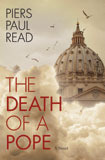 The Death of a Pope
The Death of a Pope
Piers Paul Read
Piers Paul Read's powerful tale combines vivid characters, high drama, love, betrayal, faith, and redemption in a story of intrigue, of church espionage, and an attempt to destroy the longest continuous government in the world—the Papacy. The Death of a Pope races toward an unexpected and unforgettable conclusion.
Regular price: $16.95, sale price: $3.00
 Toward the Gleam
Toward the Gleam
T. M. Doran
A story that features a giant pirate and slaver, a human chameleon on a perilous metaphysical journey, a mysterious hermit, and creatures both deadly and beautiful, this is a novel that explores the consequences of the predominant ideas of the 20th Century.
Regular price: $19.95, sale price: $10.00
 Jesus of Nazareth
Jesus of Nazareth
Pope Benedict XVI
What happened in the final week of Jesus' earthly life? Benedict brings to his study the vast learning of a brilliant scholar, the passionate searching of a great mind, and the deep compassion of a pastor's heart. In the end, he dares readers to grapple with the meaning of Jesus' life, teaching, death, and Resurrection.
Regular price: $24.95, sale price: $10.00
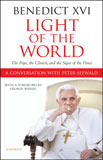 Light Of The World
Light Of The World
Peter Seewald, Pope Benedict XVI
Never has a Pope, in a book-length interview, dealt so directly with such wide-ranging and controversial issues as Pope Benedict XVI does in Light of the World. Taken from a recent week-long series of interviews with veteran journalist Peter Seewald, this book tackles head-on some of the greatest issues facing the world of our time.
Regular price: $19.95, sale price: $10.00
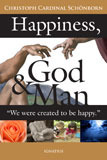 Happiness, God and Man
Happiness, God and Man
Christoph Cardinal Schoenborn
Cardinal Schönborn explains what it means to say that all human beings are created for happiness. His insightful writings are centered on meditations about happiness and also about the deeper meaning of love and friendship.
Regular price: $16.95, sale price: $7.00
Max and Benedict
Jeanne Perego
This lovely illustrated book for children (of all ages!) is a sequel to Joseph and Chico, the international best-seller that told the story of the life of Pope Benedict XVI from his youth through his election as the Pope. With the same award-winning author and illustrator, this lavishly illustrated book is aimed at children but in a way that even adults will enjoy. It takes up the story of Benedict's XVIs new life as the Pope.
Regular price: $17.95, sale price: $5.00
Chosen
Donna Steichen
The twenty-three men and women who tell their conversion stories in these pages were attracted to Catholicism in spite of a now decades-long stretch of deficient catechesis, mediocre Masses, and uninspiring leadership. Christ himself led these souls to his Church, and it is the Lord who set them to work replanting his devastated vineyard.
Regular price: $18.95, sale price: $7.00
Socrates Meets Hume
Peter Kreeft
In Socrates Meets Hume, Kreeft presents a Socratic examination of enquiry concerning human understanding in relation to the skepticism of Hume, posing questions that challenge the concepts that Hume proposed. Kreeft states that Hume is the "most formidable, serious, difficult-to-refute skeptic in the history of human thought."
Regular price: $12.95, sale price: $7.00
God's Invisible Hand
Francis Cardinal Arinze
In the style of an interview, Cardinal Arinze responds to a host of questions from journalist Gerard O'Connell. He tells his amazing life story, and how he was guided by "God's invisible hand" through many challenges. Illustrated.
Regular price: $16.95, sale price: $5.00
Charity in Truth
Pope Benedict XVI
Charity and Truth was expected to be—and is—the Pope's encyclical on "social justice." And indeed "justice" and "rights" find their proper place. But "charity" and "truth" are shown to be the fundamental principles. "Charity is at the heart of the Church's social doctrine", he writes. "Without truth, without trust and love for what is true, there is no social conscience and responsibility, and social action ends up serving private interests and the logic of power".
Regular price: $14.95, sale price: $5.00
The Battleground
Hilaire Belloc
In this religious-biblical oriented history, Belloc provides a full and fair treatment of the ancient Jews and other Middle Eastern cultures and their impact in history, and in today’s world. He affirms a special divine design in the story of Syria and particularly of Israel, reaching a climax in the event of the Crucifixion of Christ.
Regular price: $17.95, sale price: $5.00
Sacred Blood, Sacred Image
Janice Bennett
This is the story of the Sudarium of Oviedo, an ancient bloodstained cloth, believed to have covered the head of Jesus of Nazareth after his crucifixion. The author traces the known history of the linen and presents the up-to-date conclusions of EDICES.
Regular price: $19.95, sale price: $3.00
On the Way to Jesus Christ
Joseph Cardinal Ratzinger
In these meditations, Ratzinger says that the true Jesus "is quite different, demanding, and bold... The Jesus of the Gospels is certainly not convenient for us, but he answers the deepest question of our existence."
Regular price: $19.95, sale price: $7.00
Films
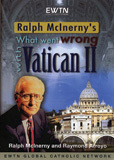 What Went Wrong with Vatican II
What Went Wrong with Vatican II
This television special brings you an insightful three-part interview with EWTN News Director Raymond Arroyo and the late, distinguished and beloved Thomist Ralph McInerny (1929-2010) on "What Went Wrong With Vatican II?"
Regular price: $19.95, sale price: $7.00
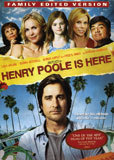 Henry Poole is Here
Henry Poole is Here
Luke Wilson stars as Henry Poole in the funny, poignant and uplifting story of a disillusioned man who attempts to hide from life only to discover he cannot escape the forces of hope.
Regular price: $19.95, sale price: $7.00
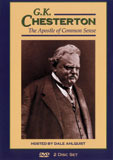 G.K. Chesterton
G.K. Chesterton
In this 14 program television series, Dale Ahlquist, president of the American Chesterton Society, discusses the life and works of G.K. Chesterton, one of modern Catholicism's most famous and prolific authors. An inspiring portrait of one of Catholicism's greatest writers ever.
Regular price: $29.95, sale price: $15.00
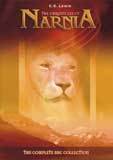 Chronicles of Narnia Set
Chronicles of Narnia Set
Welcome to the world where animals speak, strange creatures roam the land and four children fight an epic battle between good and evil. This marvelous C. S. Lewis classic allegory from the BBC is live action
Regular price: $39.95, sale price: $15.00
Music
 David Garrett
David Garrett
David Garrett's unique, and wholly individual style as a renowned violinist, pays as much homage to popular music as to Mozart and Bach. He covers an incredibly diverse selection of repertoire, representing his love for many genres, and the ability to tackle each successfully.
Regular price: $15.95, sale price: $8.00
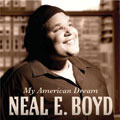 My American Dream
My American Dream
Neal E. Boyd captured the hearts of millions as the winner of the NBC hit television show, "America's Got Talent." Delivered with passion, conviction and incredible range, My American Dream captures the heart and soul of this singer who has became an unlikely hero to many.
Regular price: $17.95, sale price: $8.00
Catholic World Report and Homiletic & Pastoral Review
Gendercide at Home and Abroad
by Christopher White
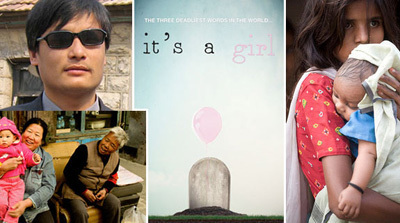
Those fighting against sex selective abortions are voices crying in the wilderness.
The practice of sex-selective abortions is a relatively new issue in the United States, but a practice that has become widespread in places like India and China, both patriarchal societies that typically prefer boys to girls. A new documentary film, It’s a Girl, produced by Shadowline Films, aims to expose this gruesome, yet common practice, which has led to what the United Nations has estimated as the loss of 200 million “missing” girls.
Unfortunately, as this documentary evidences, it’s not just that these girls are missing—it’s that they have been aborted, or killed after birth, simply based on the fact that they are girls. As the tagline of the film suggests, the phrase “It’s a girl” has become the deadliest three words in the world.
Betrayal or Integrity
by Arland K. Nichols

When it comes to protecting the right to life of the infant in the womb, there is no "middle ground" or "common ground".
Imagine for a moment that you are a physician or a nurse in a fairly typical operating room. Lying on the operating table before you is a young woman who is eighteen weeks pregnant. You are also eighteen weeks pregnant and will, in a matter of months, welcome the child within your womb into the world. Turning to your patient, you dutifully begin the surgery that has been scheduled—an abortion.
Apparently, for at least one physician, this is no mere thought experiment. Driven by “feminist pro-choice” ideology and desensitized by years of performing such abortions, this is the experience of a pregnant abortionist who writes for a popular pro-abortion blog.

The Napa Institute is Just a Little Over a Week Away!
Ignatius Press is collaborating with the Napa Institute on its second-annual convference, July 26-29, 2012, on the theme “Catholics in the next America”. The conference will focus on issues of Religious Freedom, Catholic Education, and Apologetics and Evangelization (faith and reason). It will showcase inspirational, thought-provoking presentations by world-class Catholic thinkers--bishops, priests, religious, and lay leaders.
Plus, don't miss the exclusive, special preview screening of Ignatius Press' forthcoming film, RESTLESS HEART, the story of St. Augustine of Hippo. For a sneak peak of the film, click here.
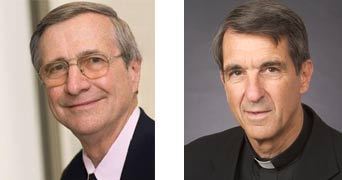
One of this year's featured presenters is Ignatius Press Founder and Editor, Father Joseph Fessio, S.J. Also among the speakers are best-selling Ignatius Press authors Peter Kreeft and Father Robert Spitzer.
Plus, Archbishop Charles Chaput of Philadelphia, Bishop Robert Morlino of Madison, Bishop Salvatore Cordileone of Oakland, Bishop Robert Vasa of Santa Rosa, Father Robert Barron, Father Norbert Wood, Frank Hanna, Leonard Leo, Hugh Hewitt, Tim Gray of the Augustine Institute, and Elizabeth Yore.

In addition to thought-provoking and inspiring speakers, the Institute will also feature superb liturgical celebrations, including traditional chant.
Conference registration is almost full, so register today!
For more information, or to register, please visit the Napa Institute website.
Click here to read the Catholic World Report article about the Napa Institue.
40% off Jack Gergurich's Pick of the Week

40% off Jack Gergurich's Pick of the Week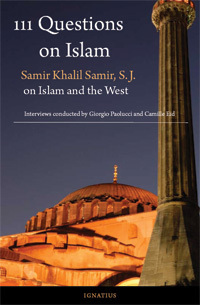 Prior to writing this piece, I checked to see what books others had already chosen. Much to my amusement I discovered that the other writers had the same problem I had: Which book do I choose?
Prior to writing this piece, I checked to see what books others had already chosen. Much to my amusement I discovered that the other writers had the same problem I had: Which book do I choose?
I settled on Fr. Samir Khalil Samir's 111 Questions on Islam. Before reading the book, I had a limited knowledge of Islam, less so than my knowledge of the subject matter of my other “favorite” books. So, this book helped me the most.
The book consists of an interview with Fr. Samir by two Italian journalists who have great knowledge of Islam, Giorgio Paolucci and Camille Eid. Fr Samir is one of the world's leading experts on Islam. About him, the journalists write,”... but it would be a mistake to consider him a mere scholar who looks only at the objects of his research with the detachment of a refined intellectual. What is striking about his personality is that his knowledge of the topic is always accompanied by a passion for humanity–a thirst for the truth that resides in every person and that the scholar is capable of discovering and expressing in words.”
111 Questions on Islam is presented in a question and answer style that lends itself to easy look-up and review. I found myself going back and forth to check my understanding of particular items as I proceeded through the book. The format helped immensely.
The questions asked by the interviewers and the answers by Fr Samir were direct, 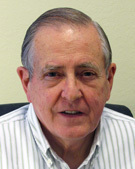 unambiguous, and comprehensive. At times, they asked for additional information about comments Fr. Samir made in order to gain greater clarity. The questions and answers were fair and charitable and at no time did I sense “political correctness.”
unambiguous, and comprehensive. At times, they asked for additional information about comments Fr. Samir made in order to gain greater clarity. The questions and answers were fair and charitable and at no time did I sense “political correctness.”
The book is comprised of five sections (The Foundations, Can Islam Change?, The Challenge of Human Rights, Islam Among Us, and Islam and Christianity) plus Appendices, a Glossary of Arabic terms, a Bibliography, and an Index. While all five sections are excellent, I found The Challenge of Human Rights and Islam and Christianity to be especially enlightening.
I highly recommend 111 Questions on Islam, especially for those with little knowledge of the subject.
Jack Gergurich has been with Ignatius Press almost ten years. He works in accounting laboring to keep the debits on the left and the credits on the right. Born and raised in Butte, Montana he moved to San Diego, California with his family as a teenager. He received a degree in Accounting from San Diego State and became a CPA. He eventually left the commercial world to work for Catholic organizations and finally (and thankfully!) ended up at Ignatius Press.
*Employee Pick of the Week program features savings of 40% off a book, movie, or compact disc personally chosen and recommended by an Ignatius Press employee. Each week, an Ignatius Press employee will select a favorite book, movie, or other Ignatius Press product and write a few sentences about why he/she thinks customers will enjoy the particular selection. A short bio of the selecting employee will also be included, giving customers a chance to learn a bit more about the people who are Ignatius Press.
Sister Pat Farrell, president of the LCWR, deflects, blames, and otherwise obfuscates
National Public Radio recently interviewed Sister Pat Farrell, the current president of the LCWR (Leadership Conference of Women Religious):
Farrell tells Fresh Air's Terry Gross that the leadership organization is currently gathering the perspectives of all of its members in preparation for its national assembly in August.
"We're hoping to come out of that assembly with a much clearer direction about [the Vatican's decision], and that's when the national board and presidency can proceed," she says.
Among the options on the table, she says, are fully complying with the mandate, not complying with the mandate or seeing if the Vatican will negotiate with them.
"In my mind, [I want] to see if we can somehow, in a spirited, nonviolent strategizing, look for maybe a third way that refuses to define the mandate and the issues in such black and white terms," she says.
In other words, let's sit down and talk about having further dialogue that will point us in the direction of additional conversations, which in turn will open up new vistas of vague and non-distinct paths ushering in an even more rewarding round of discussions, etc., etc. Frankly, this is what it is like sometimes dealing with my seven-year-old son, who is verbally skilled, sometimes manipulative, very adept at deflection, and usually refuses to back down when caught breaking rules, telling lies, or stealing sweets. A "third way"? That's simply grown-up talk for "one more chance". Refusing to define issues in such "black and white terms" is a variation on "why do you always have to be so strict about X, Y, and Z?" The key to this approach is being willing to outlast—often through endless talk!—those in authority. It also helps to be able say one thing while claiming to say another.
But, first, how about a little dose of deflection?
"The question is, 'Can you be Catholic and have a questioning mind?' That's what we're asking. ... I think one of our deepest hopes is that in the way we manage the balancing beam in the position we're in, if we can make any headways in helping to create a safe and respectful environment where church leaders along with rank-and-file members can raise questions openly and search for truth freely, with very complex and swiftly changing issues in our day, that would be our hope. But the climate is not there. And this mandate coming from the Congregation of the Doctrine of the Faith putting us in a position of being under the control of certain bishops, that is not a dialogue. If anything, it appears to be shutting down dialogue."
First, begin with a nonsensical question (my son, caught watching a television channel he knows is off limits, says, "Why does my sister get to watch whatever shes wants to?" Well, she doesn't. But he's not interested in the answer, is he?) Does Sister Farrell really ponder, with all seriousness, the question, "Can I be a Catholic and have a questioning mind?" Uh, the fact that a Catholic can even ponder such a question indicates the obvious answer: "Yes!" Crack open the Summa Theologica, one of the seminal theological and philosophical texts in the Tradition, and what do you find? Questions! Hundreds of 'em! Because we were made to question, ponder, contemplate, and wonder. But what is really being asked is this: "Can I be a Catholic and reject certain Catholic teachings?" The giveaway is in the term "complex and swiftly shifting issues in our day". The next part of deflection, of course, is blaming someone else. In this case, it's the CDF and the bishops appointed by the CDF: "But the climate is not there." Yes, that's right: the forecast for the LCWR is stormy weather, not smooth sailing.
Another tactic employed by the wayward child is claiming he or she knows better than the backwards, mean-spiriited parent. If only Mom or Dad would see how smart and enlightened little Johnny really is! Then they would admit the error of their cruel and unfair ways. The adult variation is more sophisticated, of course, but not any more convincing:
July 17, 2012
Gendercide at Home and Abroad
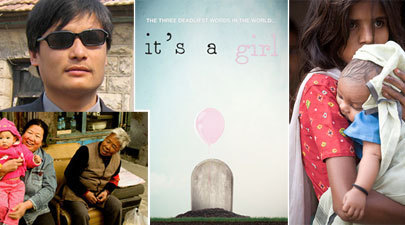
Gendercide at Home and Abroad | Christopher White | Catholic World Report
Those fighting against sex selective abortions are voices crying in the wilderness.
On April 22, 2012, Chen Guancheng, a blind Chinese civil rights activist escaped house arrest after years of torture and abuse for speaking out against the Chinese government’s one-child policy and forced sex selective abortions and sterilizations. U.S. and international officials were quick to condemn the Chinese government’s persecution of Chen and eventually the Chinese government acquiesced to international pressure, granting Chen a visa to leave China and continue his law studies here in the United States. Chen’s plight landed him on the front page of the New York Times, the cover of the Economist, and other newspapers and magazines throughout the world, while he was carefully shepherded to the U.S. with the support of the Obama administration and the State Department.
Only weeks after Mr. Chen landed in the U.S., the pro-life sting operation group, Live Action, released a series of video footage of Planned Parenthood clinics throughout the United States actively and knowingly participating in sex-selective abortions. The videos spread rapidly online and public outcry was such that it sparked a Congressional debate on whether or not to ban sex-selective abortions in the United States. When a bill was introduced that would make it illegal to knowingly perform an abortion due to the sex or gender of the child, the Obama administration—that had just weeks earlier lauded Chen’s activism in China—came out in opposition of the bill and threw its support behind Planned Parenthood under the banner of so-called “women’s health.”
The bill, which needed a two-thirds majority vote in Congress, was defeated.
July 16, 2012
Betrayal or Integrity

Arland K. Nichols | Homiletic & Pastoral Review
When it comes to protecting the right to life of the most vulnerable human being in our midst, the infant in the womb, there is no “middle ground” or “common ground” to be found. Human dignity must be protected and upheld.
Imagine for a moment that you are a physician or a nurse in a fairly typical operating room. Lying on the operating table before you is a young woman who is eighteen weeks pregnant. You are also eighteen weeks pregnant and will, in a matter of months, welcome the child within your womb into the world. Turning to your patient, you dutifully begin the surgery that has been scheduled—an abortion.
Apparently, for at least one physician, this is no mere thought experiment. Driven by “feminist pro-choice” ideology and desensitized by years of performing such abortions, this is the experience of a pregnant abortionist who writes for a popular pro-abortion blog. She describes the graphic and shocking details of her experience in the following words:
I realized that I was more interested than usual in seeing the fetal parts when I was done, since they would so closely resemble those of my own fetus. I went about doing the procedure as usual…I used electrical suction to remove the amniotic fluid, picked up my forceps and began to remove the fetus in parts, as I always did. With my first pass of the forceps, I grasped an extremity and began to pull it down. I could see a small foot hanging from the teeth of my forceps. With a quick tug, I separated the leg. Precisely at that moment, I felt a kick—a fluttery “thump, thump” in my own uterus…There was a leg and foot in my forceps, and a “thump, thump” in my abdomen. Instantly, tears were streaming from my eyes. I felt as if my response had come entirely from my body, bypassing my usual cognitive processing completely…It was an overwhelming feeling—a brutally visceral response—heartfelt and unmediated by my training or my feminist pro-choice politics…It was one of the more raw moments in my life.
This disturbing “raw moment” is disheartening and troubling, to say the least. Her account reveals the gruesome reality of what is happening in clinics throughout the world. Every ounce of this doctor’s body (and her baby’s body) reeled at what she was doing and vociferated that her actions were evil.
No euphemism made in reference to abortion can completely hide the gruesome reality of the choice that is made when a physician or mother chooses abortion. This is not “preventative health,” “choice,” “women’s rights,” “reproductive medicine,” or “health care.” It is one thing—murder—the killing of an innocent, vulnerable, and dependent human being. The experience of this physician has depicted in the “rawest” of terms the scientific fact that, along each of the developmental stages (zygotic, embryonic, and fetal), that which is in the womb is a human being. But somehow, the truth has not hindered her from continuing her gruesome task. She writes, “Doing second trimester abortions did not get easier after my pregnancy; in fact, dealing with little infant parts of my born baby only made dealing with dismembered fetal parts sadder.”
Enter the Digital Continent of Preaching
Fr. Fred Gaglia, Ph.D. | Homiletic & Pastoral Review
Our preachers must lead people to align themselves with the Church, filling the chasm of the past two or more generations of those not in touch with this treasury of truth. The goal is eternal salvation, the growth of the Church is in the balance.
Enter the “digital continent.” This term was coined by Pope Benedict XVI in 2009 to define the world of social media that has transformed patterns of communication and human relationships. It seems a new light is dawning on this “continent” for preaching as well, according to his letters to the Pontifical Council on Communications over the last two years. His May 16, 2010, message for the 44th World Communications Day, entitled, “The Priest and Pastoral Ministry in a Digital World: New Media at the Service of the Word,” reveals the Holy Father’s vision for our age: using new media as a tool for preaching. The following excerpt speaks especially to young men preparing for priestly ministry:
Responding adequately to this challenge amid today’s cultural shifts, to which young people are especially sensitive, necessarily involves using new communications technologies. The world of digital communication, with its almost limitless expressive capacity, makes us appreciate all the more St. Paul’s exclamation: “Woe to me if I do not preach the Gospel” (1 Cor 9:16). The increased availability of the new technologies demands greater responsibility on the part of those called to proclaim the Word, but it also requires them to become more focused, efficient and compelling in their efforts. Priests stand at the threshold of a new era: as new technologies create deeper forms of relationship across greater distances, they are called to respond pastorally by putting the media ever more effectively at the service of the Word. 1
Clearly, the Holy Father is talking about the responsible use of social media (the Internet, Facebook, YouTube, and Twitter), by those called to proclaim the Word. This amounts to acquiring better focus in our pastoral response.
On February 7, 2011, the Holy Father took up this topic again in his most recent address to the plenary assembly of the Congregation for Catholic Education:
In these days you also studied the draft of the document on the Internet and formation in the seminaries. Because of its capacity to surmount distances and put people in mutual contact, the Internet presents great possibilities also for the Church and her mission. With the necessary discernment for its intelligent and prudent use, it is an instrument that can serve not only for studies, but also for the pastoral action of future presbyters in different ecclesial fields, such as evangelization, missionary action, catechesis, educational projects, and the management of institutes. Also of extreme importance in this field is to be able to count on adequately prepared formators who will be faithful guides and always up-to-date, in order to support the candidates to the priesthood in the correct and positive use of the media. 2
His insights set the stage for updating seminary homiletics courses to include chapters on how to enhance preaching through the use of digital media. There is no avoiding it. Now is the time for us to consider how to eliminate the word “boring” from the feedback of the people regarding preaching in most Catholic parishes. You know the statistics concerning Mass attendance. Preaching using the new media may improve those statistics by keeping more in tune with people on the digital continent.
July 14, 2012
The Profession of Journalism and Professions of Faith
I've been having a daydream about calling The Washington Post and complaining about how the Catholic Church expects Catholics to actually believe Catholic teaching. One version goes like so:
Me: Hello! I'm a Catholic who feels led by the Holy Spirit to reject certain teachings of Church leaders.
WaPo: Oh, really? Cool—er, I mean, how interesting. Are you opposed to the Church's rigid stance against reproductive justice? Its bigoted refusal to give women positions of power? Its mindless rejection of contraception and complete disregard for women's health issues?
Me: Oh, no. Nothing silly like that. No, I'm good with all of that stuff. Actually, I'm talking about the Church's emphasis on helping the poor, acting charitably toward my neighbors, supporting the disadvantaged and downtrodden, taking care of orphans, and so forth. Boring. Can't be bothered. And it's so old-fashioned, don't you think? Oh—and I'm also fed up with the Church's teaching about respecting governmental authority, being a good citizen, and doing all I can for the common good. And I'm—
WaPo: Uh. One second. Huh. Aaaah, are you serious?
Me: What? Really? Are you doubting my ability to feel the Holy Spirit prompting me in this way? Are you calling into question my sacred and infallible conscience? Because my conscience is clear about these things.
WaPo: Well...um...that's a bit different than what we're used to, uh, hearing. Ahem. We're all for helping the poor. And—
Me: But I saw your article about the Sunday School teachers in the Diocese of Arlington who have resigned because they won't sign a Profession of Faith, and I thought my situation was rather similar. But I'm sensing that you have some sort of litmus test of your own for what is moral and right. Does this mean that you believe we should help the poor, treat others well, and obey the law?
WaPo: Sure. Of course. That's just part of being an adult and a citizen of the United States. Everyone has certain responsibilities as well as rights. So I—
Me: Unless they are Catholics?
WaPo: What do you mean?
Me: Your article, "Arlington Diocese parishioners question need for fidelity oath" (July 11, 2012), made it sound as though Catholics should have the right to reject various Church teachings while also having the right to teach Church teachings in parishes. Where is the responsibility in that? Your reporter, for example, wrote: "But for some, particularly more liberal Catholics, the oaths are an alarming effort to stamp out debate in the church at a time when it is bleeding members and clergy in the West." Yet it's not as if Church teachings about ordination, contraception, and other matters of faith and morals have been top secret over the centuries. I assume you've heard of the CCC?
WaPo: Uh, sure I have. Isn't that the abbreviation for "Customized, Cafeteria Catholiciism"?
Me: Good one! [Fake laughter] By the way, I want you to know that everything I said about rejecting Church teaching about the poor and needy was just talk—I don't actually give assent to any of it. But I figured you wouldn't be bothered by me giving lip service to something I don't actually believe since a July 12th post on your blog stated, "The oath goes beyond requiring Catholic religious educators, who are church volunteers, to teach official church doctrine; it requires them to affirm that they believe it."
WaPo: But that's misleading! You sai—
Me: I merely took the position advocated by your blogger: I said something but without actually believing it. Complain to her, not to me.
Alas, it's merely a dream. However, on the plus side, the newspaper did post a piece, "On Catholic oath of fidelity", by a seminarian, Bill Erwin. He makes several good points, including this:
The Memorial of Blessed Kateri Tekakwitha
Today is the Memorial of Blessed Kateri Tekakwitha, the first Native American to be on the road to canonization, a process that was given formal recognition on December 19, 2011, when the Holy See announced that Pope Benedict XVI had approved the Congregation for the Causes of Saints’ findings that miracles attributed to Tekakwitha and six others blesseds were authentic. Here is a bit about her life, from this February 2012 Catholic World Report article by Brian O'Neel:
Blessed Kateri Tekakwitha
Born in 1656, near Auriesville, NY, and nicknamed the “Lily of the Mohawks,” Bl. Kateri Tekakwitha was the daughter of a Mohawk chief and an Algonquin mother who was Catholic. After her parents and brother died of smallpox, she became a ward of her uncle at age eight. As her mother passed, she enjoined her daughter to always hold onto her holy Christian faith and pressed her rosary into Kateri’s hands. The young girl also had the disease but survived, although it left her with cratered skin and very bad eyesight. In fact, Tekakwitha, which most normally think of as her last name, is actually an Indian sobriquet meaning, “She who bumps into things.”
Keeping her promise to her mother was difficult as her uncle hated his late sister-in-law’s faith. Like many Iroquois, he attributed the disease, death, and woe that had done so much damage to his proud people on Christianity and the missionaries who spread this strange religion.
By the time she turned eighteen, remembering her mother’s Catholicism, she began receiving catechesis. This coincided with her uncle betrothing her to a local boy. Given his attitude toward Christianity, however, one can imagine how well he received Kateri’s refusal to accept the match, as well as her declaration that she belonged to God alone and would for the rest of her life. Though upset, her uncle respected her wishes and even reluctantly agreed to her receiving baptism. The condition: She must stay with her people.
The problem was that her people thought her the biggest fool and even something of a traitor for professing Christ. She became the village pariah, and she received several death threats. For two years she endured this abuse before finally fleeing to a village of other Indian Catholics in neighboring Canada. It was there that she received her First Communion on Christmas 1677. And there she became a beloved member of the community and served her fellow Indians as a consecrated virgin.
Within a short time, though, she contracted a painful illness, and after years of suffering, she died on April 17, 1680, uttering the words, “Jesus, Mary, I love you.” As she expired, the severe small pox-induced scars that had marred her face since childhood faded bit-by-bit as if they had been part of a mirage. People were amazed at her radiant beauty, since they had only known her as something of an ugly woman.
Believing they had a saint on their hands, her former neighbors immediately began asking heaven for her intercession, and the priest who had given her last rites claimed many miracles were wrought by her prayers. Her cause for beatification began in 1884 and concluded in 1980, when she became one of the first people Bl. John Paul II beatified.
A hint of the pride many Native Americans are taking in the canonization announcement are the words of Anna Dyer, 84, a Mohawk living in New York, who said, “She was always Indian. She never forgot.”
Still, not every Indian is thrilled. Tom Porter is a Mohawk living near the Canadian-New York border whose mission is to return his people to their ancient beliefs in the moon, the sun, and thunder. He asserts, “She was used.”
“I don’t know if she really was a Christian or not,” he told Agence France Presse. “They were in poverty at that time. The Europeans had destroyed everything, people were destitute and starving, and if you wanted to get help of any kind you had to be a Christian.”
Acknowledging that some of his Catholic relatives have a deep devotion to Bl. Kateri, he says, “It breaks my heart.”
Nonetheless, those Catholic Americans of all stripes—indigenous or no—who know of Bl. Kateri are thrilled and proud such an outstanding example of holiness has come from their shores.
Furthermore, in more universal terms, both women are a good example of what the Pope told a general audience in January 2010: “In every age the saints are the true reformers of the Church’s life,” for as blogger Rocco Palma has noted, both had the “ability to inspire and challenge others to embrace a deepened fidelity to Christ and the Gospel, and [to imitate] the integrity of their witness.”
Read the entire article on the CWR site.
God calls, God chooses, God cures.
A Scriptural Reflection on the Readings for Sunday, July 15, 2012 | Carl E. Olson
Readings:
• Am 7:12-15
• Ps 85:9-10, 11-12, 13-14
• Eph 1:3-14
• Mk 6:7-13
God calls, God chooses, God cures.
Amos was the first of those men sometimes called the “classical prophets,” that is, those prophets whose messages were placed within a book. He is mysterious, but we know he lived in the eighth-century B.C. and was from the small town of Tekeo in the hills of Judah. He was a herdsman, breeding and raising livestock, most likely sheep, but perhaps also cattle. He was, in other words, an ordinary man trying to make an ordinary living.
As today’s reading from the book bearing his name suggests, Amos was a reluctant prophet. In fact, he insisted he was not a prophet, which may have been a refutation of the charge that he was a professional prophet working for hire. No, Amos insisted, he was called by God, who said to him: “Go, prophecy to my people Israel.” His reluctance is understandable, for his task to was bleak: to announce judgment, expose sin, renounce hypocritical and unjust religious rulers, and proclaim approaching doom.
Was Amos called to perform these tasks because God was unfairly harsh or bent on destruction? No, his calling was an act of love, an offering of salvation to those who had forgotten who they were and had turned away from what they should do and be. So when God called, Amos answered.
One of the great themes found in Apostle Paul’s writings is that God has chosen us and, as we hear in today’s reading from the opening chapter of the Epistle to the Ephesians, “destined us for adoption.” This entire passage is an overwhelming outpouring of thanksgiving and joy, as the opening verse readily indicates: “Blessed be the God and Father of our Lord Jesus Christ, who has blessed us in Christ with every spiritual blessing in the heavens…”
These blessings, Paul writes, include redemption by Christ’s blood shed on the Cross, forgiveness of sins, the riches of grace lavished upon us, the hearing of the word of truth—the gospel, and the seal of the Holy Spirit. These are all part of the great mystery of salvation, in which God’s divine life is granted to us—not in a merely metaphorical or poetic fashion, but really and truly. “We can adore the Father,” explains the Catechism, “because he has caused us to be reborn to his life by adopting us as his children in his only Son …” (par. 2782).
This gift is completely gratuitous; it is undeserved and cannot be earned on our part. Rather, it was earned on our behalf by the sacrificial love, life, and death of our Lord Jesus Christ. The unique, eternal Son of God became a man and entered the temporal realm of time and history so men enslaved to sin and death could become sons of God. So it is God who chooses us for adoption.
Having become man, the Son willed to have his apostles share in his work. In today’s Gospel the Twelve are depicted sharing in the Son’s work as a physician of body and soul, his unique ability to heal the body and to forgiven sins. This passage is part of the basis for the Church’s teaching about the sacrament of the anointing of the sick. Jesus summoned the apostles to follow him, to share in his life of sacrifice and poverty, and then to “share in his ministry of compassion and healing” (CCC, par. 1506).
The Council of Trent noted that Mark 6:13 and James 5:14-15 showed that the sacred anointing of the sick was instituted by Christ “as a true and proper sacrament.” This sacrament is not just for those who are facing death, although it is often known as “extreme unction.” It is meant to be celebrated within the Eucharist (CCC, par. 1517), for God saves the entire person, body, soul, and spirit. Thus the Twelve preached repentance as well as drove out demons and cured the sick.
God calls—are we listening? God chooses—are we willing? God cures—are we accepting?
(This "Opening the Word" column originally appeared in the July 12, 2009, edition of Our Sunday Visitor newspaper.)
Carl E. Olson's Blog
- Carl E. Olson's profile
- 20 followers




